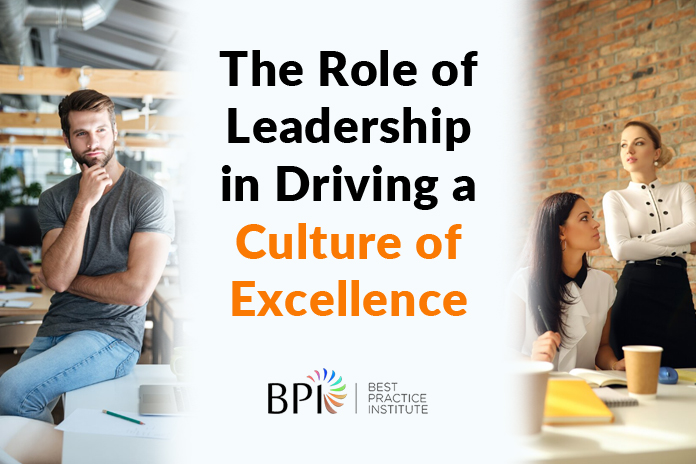Leadership is vital in shaping organizational culture. A culture of excellence is characterized by high standards, continuous improvement, and a commitment to achieving the organization’s goals. This article explores how leadership drives a culture of excellence, focusing on organizational values, leadership development, employee empowerment, and continuous improvement.
Organizational Values
Organizational values guide and define the behavior and actions of employees. Leadership plays a crucial role in defining and reinforcing these values. Leaders who embody the organization’s values set a positive example for others.
They ensure these values are integrated into every area of the organization, from decision-making to employee interactions. Leaders create a culture where excellence is encouraged and expected by aligning behavior with values.
Reinforcing Organizational Values
Leaders should continuously reinforce organizational values through actions, decisions, and communications. By consistently demonstrating these values, leaders set the tone for the organization and inspire others to uphold them. It helps create a cohesive culture that aligns everyone with the organization’s core principles.
Integrating Values into Practices
Leaders must ensure that organizational values are integrated into everyday practices and processes. It can include incorporating values into performance evaluations, decision-making frameworks, and employee recognition programs. Leaders can reinforce a culture of excellence by making values a part of the organizational fabric.
Leadership Development
Leadership development is vital for building a culture of excellence. Leaders must have the skills and knowledge to inspire, motivate, and empower their teams. Organizations that have leadership development programs create a pipeline of future leaders who can drive excellence.
These programs should focus on developing core leadership competencies such as communication, decision-making, and strategic thinking, fostering continuous learning and growth.
Building Leadership Competencies
Leadership development programs should focus on building core competencies essential for driving excellence. These may include skills such as communication, collaboration, problem-solving, and emotional intelligence. By developing these competencies, leaders can inspire and help their teams toward achieving excellence.
Fostering a Learning Culture
Leaders should promote a culture of continuous learning and growth within their teams. It can be accomplished by encouraging employees to seek new challenges, learn from failures, and pursue development opportunities. By fostering a learning culture, leaders can ensure that their teams constantly strive to improve and innovate.
Employee Empowerment

Empowering employees is another critical aspect of driving a culture of excellence. Leaders should create an environment where employees feel empowered to take ownership of their work and contribute their ideas and insights.
It can be achieved through delegation, providing autonomy, and recognizing and rewarding employee contributions. Employees who feel valued and empowered have higher engagement levels, more motivation, and greater commitment to achieving excellence.
Encouraging Autonomy
Leaders should empower employees by giving them the autonomy to make decisions and take ownership. It can help people feel more engaged and motivated, ensuring higher levels of performance and satisfaction. Leaders can cultivate a culture of empowerment and excellence by trusting their employees and giving them the freedom to excel.
Recognizing and Rewarding Contributions
Leaders should recognize and reward employees for contributing to the organization’s success. It can be accomplished through formal recognition programs and informal gestures such as praise and appreciation. By acknowledging the value of employee contributions, leaders can reinforce a culture where excellence is celebrated.
Continuous Improvement
Continuous improvement is a core principle of an excellence culture. Leaders are critical in driving continuous improvement by encouraging innovation, fostering a learning mindset, and promoting a culture of feedback and reflection.
Leaders should lead by example, showing their commitment to continuous improvement through their actions and decisions. By prioritizing continuous improvement, leaders can ensure that the organization is always striving to be better tomorrow than it is today.
Promoting Innovation
Leaders should encourage innovation by creating a supportive environment that welcomes and encourages new ideas. It can involve providing resources and support for innovation projects and recognizing and rewarding innovative thinking. By promoting innovation, leaders can drive continuous improvement and help the organization stay ahead of competitors.
Leaders can further encourage innovation by fostering collaboration among team members. Leaders can stimulate creativity and generate innovative ideas by creating cross-functional teams and encouraging diverse perspectives. Additionally, leaders should provide time and space for experimentation, allowing employees to test new ideas without fear of failure. It can help cultivate a culture where innovation is valued and rewarded, ultimately driving continuous improvement and organizational success.
Emphasizing Feedback and Reflection
Leaders should promote a culture of feedback and reflection, where employees are encouraged to seek feedback on their performance and reflect on ways to improve. It can help identify areas for improvement and opportunities for growth, leading to continuous learning and development. By emphasizing feedback and reflection, leaders can foster a culture of continuous improvement and excellence.
In addition to promoting a culture of feedback, leaders should actively seek input from their teams and use it to improve their leadership skills. Leaders should also ensure open and honest communication, creating a safe space for people to share their thoughts and ideas. Through a culture of feedback and reflection, leaders can create a learning organization where continuous improvement is the norm.
Final Word
Leadership plays a central role in driving a culture of excellence. By embodying organizational values, investing in leadership development, empowering employees, and promoting continuous improvement, leaders can create an environment where excellence thrives. Organizations prioritizing leadership and culture are better positioned to achieve their goals, adapt to change, and succeed in today’s competitive business landscape.
To learn more about how leadership can drive excellence in your organization, contact Best Practice Institute (BPI) today. Our research and consulting services can help you cultivate a culture of excellence that sets your organization apart.










